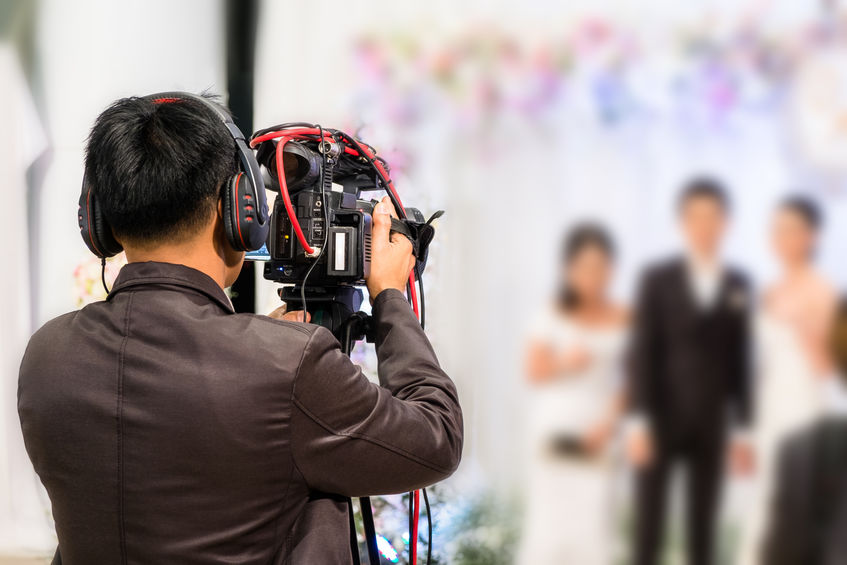 Technology has changed a lot about how couples plan and celebrate their wedding. Wedding websites, online registries, wedding hashtags, photography and videography; the list goes on and on. One of the most useful technologies that has come to the forefront of the wedding industry, along with many other industries, in 2020 is livestreaming.
Technology has changed a lot about how couples plan and celebrate their wedding. Wedding websites, online registries, wedding hashtags, photography and videography; the list goes on and on. One of the most useful technologies that has come to the forefront of the wedding industry, along with many other industries, in 2020 is livestreaming.
In the wake of the coronavirus pandemic, which has severely limited our ability to gather together in person, livestreaming has become a safe alternative for sharing your wedding day with loved ones without putting them at risk. It’s not as easy as pointing and clicking a camera when the time comes though. Use these tips below to ensure that when you get hitched, your livestream goes off without a hitch!
1) Choose a platform that fits your needs.
There are quite a few options for livestreaming your ceremony that are affordable (many are free) and easy enough to use. However, different platforms come with different restrictions, so it’s important that you choose one that will fit the needs of your ceremony.
For example, the last thing you want is for guests to be kicked off right as you’re saying “I do” because the time limit on your free platform version is up! Be sure to look into cost, limitations on number of viewers, time restrictions, private vs. public streaming, and other factors that could impact your guests’ livestream experience.
2) Decide if you want to manage the livestream yourself or hire a professional.
Like with most aspects of your wedding, hiring a professional to handle your ceremony’s livestream is going to be the easiest option. A videographer will know how to run the stream, ensure the highest quality video, and likely be able to record the livestream for you to watch back at a later date.
If you choose to go the DIY route though, you will still want someone to be in charge of managing your ceremony livestream. Ask a friend or family member to be the designated livestream person, ensuring the stream is set up correctly, running smoothly, and who can be there to address any technical issues that could pop up.
 3) Coordinate the logistics of your livestream with your ceremony team.
3) Coordinate the logistics of your livestream with your ceremony team.
If you have decided to livestream your wedding ceremony, you will need to get with all of the vendors who will be involved on the big day to confirm all parts of your ceremony can be streamed. Start by checking with your venue to see what their policies are on streaming and to make sure they accommodate your setup.
You should also discuss livestreaming with your wedding officiant, so they can tailor the ceremony for the best in-person and virtual experience. Other vendors to coordinate with would be your wedding planner, any live musicians, and your photographer.
4) Determine the best camera setup before the day of your ceremony and do a livestream test.
You don’t want to have to deal with any issues or have any worries about your livestream on the day of your ceremony. When you do your rehearsal, or even before if possible, you should also do a test run to ensure all livestreaming equipment is placed and working properly.
Find a spot for your camera that is discreet, but offers the widest unobstructed view. This location should also have good lighting for guests to see you on camera, as well as a reliable internet connection. Using a tripod can help keep the camera steady. Depending on your venue, you may want to consider using additional lighting or an external microphone to enhance your livestream. Make sure you test the internet, video, and audio before the ceremony—and don’t forget to charge your device!
5) Make sure everyone knows how to access your livestream.
If you will be livestreaming your wedding ceremony, you will need to decide how to best distribute the link and any directions for access to guests. One option could be to mail out follow-up invites to guests who RSVP no, offering the livestream as an alternative. Or, you could include a “virtual” option directly on your invitation and ask guests to send back their answer with an email address to which you can send the link. You may even just post the link on your wedding website or social media, leaving the option open to anyone who wants it.
Depending on how public or private you want your ceremony to be, you might consider setting up a password-protected livestream. That way, you can send the password to designated guests without requiring their direct reply and avoid uninvited crashers.
If you’re planning a virtual wedding ceremony, you need to work with an officiant who can be flexible and accommodating to your needs. In Las Vegas, that officiant is Pastor Ed Bruning at Casual Elegance! Pastor Ed will do whatever it takes to make your wedding ceremony the special experience you’ve always envisioned for you and your guests, both in-person and virtual.
Contact us today to discuss your wedding ceremony needs!
